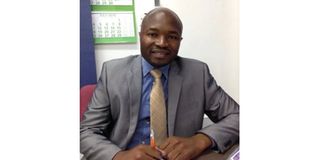Mwesigwa urges TFF voters to elect professional leaders

TFF Secretary General Celestine Mwesigwa
What you need to know:
- Incumbent Wallace Karia is the sole candidate for the top seat, while many current members across six regional committees are seeking re-election.
Dar es Salaam. As Tanzanian Football Federation (TFF) members prepare to elect new leadership Saturday August 16, 2025, former TFF Secretary General Celestine Mwesigwa has emphasized the need for leaders with expertise to guide the federation into a modern era.
The election, set to take place in Tanga, will see several positions contested, including the presidency.
Incumbent Wallace Karia is the sole candidate for the top seat, while many current members across six regional committees are seeking re-election.
Among the new faces expected to “shake things up” is Hosea Lugano, a finance and economic expert contesting a seat on the Executive Committee.
He represents Zone One, which covers Dar es Salaam, Lindi, Mtwara, Pwani, and Morogoro. Lugano is seen as a strong contender thanks to his qualifications and ability to view football as both a sport and a business opportunity, combining economic strategy with practical management experience.
He faces competition from Lameck Nyambaya, as well as other regional candidates including James Mhagama, Evance Mgeusa, and Cyprian Kuyava.
In Zone 5, candidates include Vedastus Lufano and Salum Kulunge, while other regions have single nominees.
Commenting on the election, Mwesigwa noted that the sports world is evolving, with revenue streams in football constantly changing. He stressed that leaders with professional expertise are crucial for contributing to both the economy and the development of football in Tanzania.
“Even one qualified leader is invaluable. Today’s football involves business, advertising rights, sponsorships, and more. Skilled leaders make a substantial impact on markets and help drive our football forward,” Mwesigwa said.
Regarding Zonal contests, he pointed out that while many incumbents are defending their seats, new candidates like Lugano bring innovative strategies for the sport’s economic growth.
Football analysts have highlighted Lugano as one of the professionals needed to modernize TFF, noting that having experts on the Executive Committee will enhance commercial growth and resource management. If elected, Lugano plans to advise the president on positioning Tanzanian football as an engine for economic development.
His vision includes financial self-sufficiency through investment projects, improved commercial agreements, and stronger international partnerships.
He aims to implement a five-year plan that will put Tanzanian football firmly on Africa’s sports business map.
Before entering the TFF election, Lugano had a proven track record of transforming struggling institutions into profitable, efficient operations. He stressed that the success of football in Tanzania depends on collaboration among clubs, stakeholders, and both government and private organizations, which together can drive the sport forward in the country.




